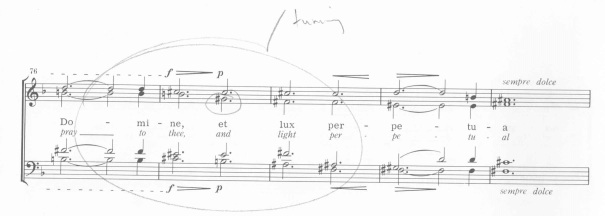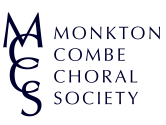Singing in tune is not always easy, but it’s a lot easier if you listen!
That might sound like an obvious statement, but I see lots of people in amateur choirs who spend too much time with their head in the copy, more or less blinkered to the outside world. Their focus is on singing the right notes. There are many who feel less than confident in their music reading skills, so this is understandable – but it’s still unacceptable. There has to be a better way.
MCCS is a fine form at the moment. We are currently working on Fauré’s Requiem, a firm favourite in the choral repertoire, but by no means easy. There are few to rival Fauré when it comes to harmonic inventiveness, and there are places in this work where the key changes, thrilling as they are, can cause real problems with intonation. But these issues shouldn’t be insurmountable if the choir know what they are listening for – and this choir does!
The first thing to be quite clear about is that singing in tune is more often that not a vertical thing, not a linear one. In other words, it’s not about pitching successive intervals in the vocal line, but rather how each note fits with the rest of the chord. In order to do this, choirs need to understand a little bit about harmony, and they need to listen.

Let’s take this passage in the middle of the Libera me. One chord per bar, which alternates between simple major or minor chords, and dominant sevenths. The dominant seventh has a distinctive sound, and the choir needs to be able to recognise it – just an ordinary chord but with an extra splash of colour; a quick demonstration on the piano (with – without, with – without) is all that is needed. I rehearse a passage like this one chord at a time, unaccompanied, and by insisting that the choir listen to the sound of the whole chord, each singer is given responsibility for their own tuning. In this passage the altos were very quick to realise that in alternate bars they had the sevenths. All of a sudden, it’s not just a continuation of the same note, but a change into an altogether more exciting version of the same note, and as a result the choral sound on this chord was so much more vibrant.

Bar 77 is more problematic; here comes one of Fauré’s stunning modulations, and in all likelihood, some tuning problems – intonation can tend to slip here. The basses need to know that they are headed for the third of the chord in bar 78. In rehearsal, I focus in on this chord [F# major, first inversion.] We need to ensure that each section of the choir can hear the ‘place value’ of their note in the chord, especially the basses who have the major third. This becomes a ‘meeting place’ chord – somewhere to regroup, where everyone knows where they are with regards to tuning – before moving on. And now we go back to bar 70, still unaccompanied, and stop on the first chord of bar 78 to check that the tuning of this chord is secure before we continue.
There is a world of difference between singing at the same time, and singing together.
This kind of work ensures that every member of the choir realises that critical listening is an integral part of choral singing; it’s not just the singing, but the listening as well. And it gets better – a choir which listens carefully to tuning also listens carefully to the balance between the voices and to the overall choral sound. Our rehearsal last week demonstrated this brilliantly; after a few minutes of work on this passage, the choir sounded as good as it ever has done.
Our next concert in on Sunday 10 June – Fauré Requiem and Vaughan Williams Benedicite and Serenade to Music.
 Our next concert will be on Sunday 7 June 2020, and will include Duruflé’s Requiem and Rejoice in the Lamb by Benjamin Britten. And for the first time in ten years we will be giving a concert outside Monkton! Holy Trinity, Bradford on Avon is a beautiful church with a fine acoustic and a newly renovated organ.
Our next concert will be on Sunday 7 June 2020, and will include Duruflé’s Requiem and Rejoice in the Lamb by Benjamin Britten. And for the first time in ten years we will be giving a concert outside Monkton! Holy Trinity, Bradford on Avon is a beautiful church with a fine acoustic and a newly renovated organ.





 Tickets are now available for our forthcoming performance of Handel’s Messiah. Please book them now to avoid disappointment, either by emailing music@monkton.org.uk or calling 01225 721129. Price £8.
Tickets are now available for our forthcoming performance of Handel’s Messiah. Please book them now to avoid disappointment, either by emailing music@monkton.org.uk or calling 01225 721129. Price £8.